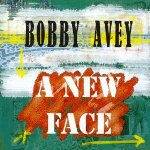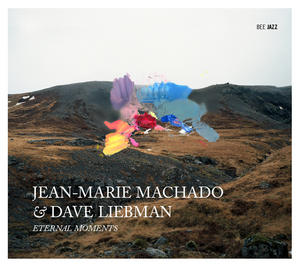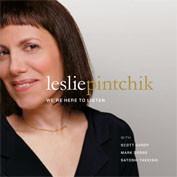Home » Jazz Articles » Multiple Reviews » Two Aspects of Dave Liebman
Two Aspects of Dave Liebman
And although Liebman's presence is the common denominator, it is more than a little unfair to the leaders on each date to identify these discs under the veteran saxophonist's name. For, if it is clear that Liebman came to play, it is equally clear that he came to lend a little of his notoriety to his two younger collaborators, pianists both: Bobby Avey (born 1985) and Jean-Marie Machado (born 1961).
Listening to these discs side by side suggests that there are (at least) two David Liebmans, and in fact, these two dimensions of Liebman's playing can already be discerned in two differing tracks from the saxophonist's 1973 work with Miles Davis. Both were unreleased until their appearance on The Complete On The Corner Sessions (Sony, 2007) box set.
The first is "Mr. Foster," recorded in September 1973. Known in some discographies as "For Dave," this piece would later transmogrify into a part of Davis' tectonic Agharta (CBS, 1975) suite. On "Mr. Foster," Liebman's tenor playing is sinuous and supple, with long, smooth melodic lines and sustained notes. It's the "Mr. Foster" Liebman who reappears in the saxophone and piano duets on the Eternal Moments record with Machado.
The second forerunner of these 2010 releases can be heard on "The Hen," recorded in January 1973. If Liebman's solo on "Mr. Foster" evinced no shortage of melodic ideas, on "The Hen," he cannot seem to get the ideas out fast enough: his soprano saxophone playing is a torrent of energy and experimentation. The fierce soloist who appears on half the tracks of the Bobby Avey album is the Liebman of "The Hen."
Both pianists on these records have readily apparent classical training. Liebman is a soloist most comfortable with the harmonic complexity a classically-minded pianist can provide; this is most evident in his long-lasting partnership with Richie Beirach, co-leader with Liebman of the quartet Quest. Indeed, if there was a problem for Liebman in the Miles Davis group, it was precisely the absence of harmonic complexity that could be a foil for the saxophonist's relentless melodic energy.
That said, Avey and Machado draw from very different parts of the classical continuum, and that's partly why Liebman draws on his "Mr. Foster" persona in the one case and his "Hen" persona in the other.
 Bobby Avey
Bobby AveyA New Face
Jay Dell Records
2010
Avey has transposed his classical roots to a jazz setting together with Liebman before: he drew upon Chopin, Schubert, Mendelssohn and others for a strong set of duets with Liebman, Vienna Dialogues (ZOHO, 2006). A New Face's "In Retreat" nicely displays the combination of elements at work. The classical components are present in the statement of the theme, for example, while drummer Jordan Pearlson's playing reminds us that this is a jazz set. On this track as throughout, Liebman's voice is multitudinous and sharp, harkening back to 1973's "The Hen."
It's a testament to the strength and clarity of Avey's musical vision that the four tracks with Liebman do not overshadow the four trio tracks. Indeed, the trio finds a rocking groove against which to highlight the classical accents, on "Late November," "Delusion"(with its piano leaps worthy of Cecil Taylor), and "Half is Less Than Half," in all of which Pearlson's propulsive percussive intelligence is in the foreground.
"Influence" is duet for saxophone and piano. As elsewhere on the disc, Avey favors the apocalyptic and Liebman the searing, but the pair find a quiet poise following the sound explosion, about two-thirds of the way into the piece.
 Jean-Marie Machado & Dave Liebman
Jean-Marie Machado & Dave LiebmanEternal Moments
Bee Jazz
2010
The quiet spot in Avey and Liebman's "Influence" could be seen as an appearance of the saxophonist's "Mr. Foster" persona, a personality that prevails on his series of piano-saxophone duets with Machado. This is clear from Liebman's earliest intervention on Eternal Moments, flurries of his soprano saxophone notes fluttering lightly rather than aggressively above Machado's lovely composition "The Little Dog Waltz."
This is a balanced set, with nice dynamic contrasts between the slower-paced "The Gravel and the Bird," "Só à noitinha," and "Ugly Beauty"—Thelonious Monk's only waltz—and the more brisk "Reveil de la mariée" and "Blue Spice." The more languid numbers provide Machado with plenty of opportunity to illustrate his considerable prowess as a self-accompanist, and Liebman with plenty of space to unfurl his looping solos. Four compositions are Machado's, two are Liebman's, complemented by three disparate covers.
Machado's classical reference points are more post-romantic and impressionistic—Debussy, say, or Ravel, whose "Le réveil de la mariée" is adapted here—than Avey's. The pianist likewise draws upon his Portuguese roots in an understated reading of the fado classic "Só à noitinha," immortalized by singer Amália Rodrigues.
Liebman is credited with "saxophones," but the wind instrument that opens "Les yeux de Tangati," or which dreamily states the theme of "Só à noitinha" sounds for all the world like a tin whistle. On the latter fado number, Machado accompanies the slight, high-pitched horn with pianissimo notes from the far right-hand side of the keyboard, lending an ethereal character to the performance. It's in keeping with the airy grace of the album as a whole.
Tracks and Personnel
A New Face
Tracks: Late November; In Retreat; Delusion; A New Face; Half Is Less Than Half; Influence; Insight; Time Unfolding.
Personnel: David Liebman: soprano & tenor saxophones (2, 4, 6, 8); Bobby Avey: piano; Thomson Kneeland: bass (1-5, 7, 8); Jordan Pearlson: drums (1-5, 7, 8).
Eternal Moments
Tracks: Little Dog Waltz; Les yeux de Tangati; The Gravel and the Bird; Le réveil de la mariée; Só à noitinha (Saudades de ti); Ugly Beauty; Fuschia; Blue Spice; Moment calme.
Personnel: Dave Liebman: saxophones; Jean-Marie Machado: piano.
Tags
Dave Liebman
Multiple Reviews
Jeff Dayton-Johnson
United States
BOBBY AVEY
Jean-Marie Machado
Miles Davis
Richie Beirach
Quest
Cecil Taylor
Thelonious Monk
PREVIOUS / NEXT
Support All About Jazz
 All About Jazz has been a pillar of jazz since 1995, championing it as an art form and, more importantly, supporting the musicians who make it. Our enduring commitment has made "AAJ" one of the most culturally important websites of its kind, read by hundreds of thousands of fans, musicians and industry figures every month.
All About Jazz has been a pillar of jazz since 1995, championing it as an art form and, more importantly, supporting the musicians who make it. Our enduring commitment has made "AAJ" one of the most culturally important websites of its kind, read by hundreds of thousands of fans, musicians and industry figures every month.




















